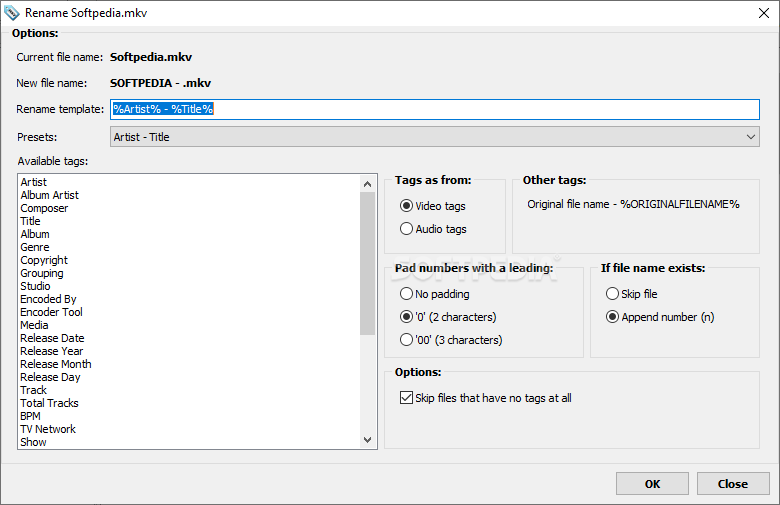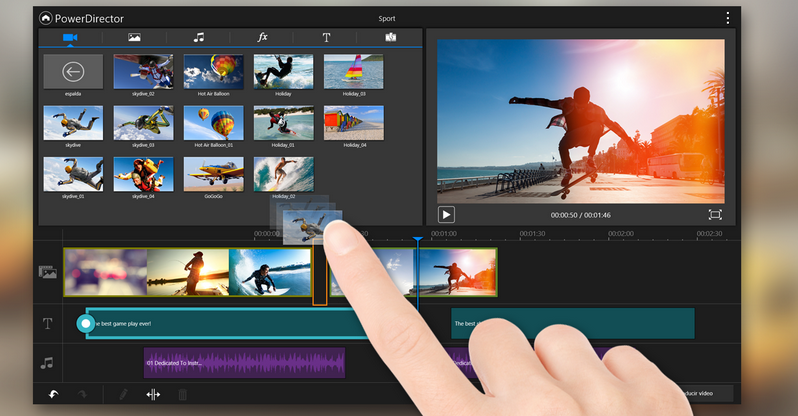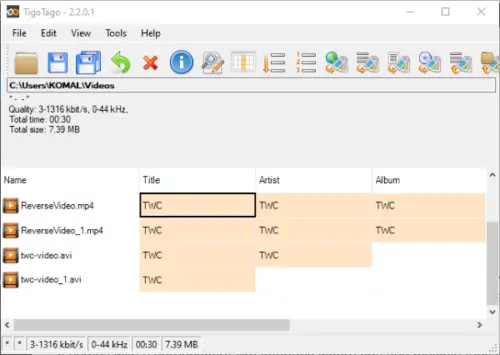This MKV editor supports MKV to MP4, AVI, FLV, M2TS, MP4, MP4 (Theater), TS and MKV to WMV conversion. With this free software, you can also edit MKV metadata, like the video, audio, subtitles and add some video effects to your file. Most importantly, it can edit MKV in batches, so you can import multiple files to this tool. Now, let see how it. Order ranked higher if support MP4 and MKV and if can pull metadata from sources like tmdb, etc. 1) MetaX (MP4, MKV and others) - Not free, 10 USD 2) Mp3tag (MP4, MKV - added in v2.85, but Matroska covers not yet supported) 3) MKV & MP4 Video Manager (MP4, MKV) - Not free, 25 EURO 4) chapterEditor (MKV only) 5) MKVBuddy (MKV only) 6.
- Mkv Metadata Editor Software
- Mkv Metadata Editor Windows 10
- Mkv Metadata Editor Software Download
- Mkv Metadata Editor
A straightforward tag editor that can process your Matroska container files and allow you to append a wide range of metadata info
MKV Tag Editor is a user-friendly solution for all those who want to modify the tags of their Matroska container files.
Neatly organized GUI
The first step you need to take is to browse to the folder where your MKV files are stored. You should keep in mind that both video and audio files are supported, so you can also process MKA, MKS and MK3D formats.
You just need to add the items you are interested in, then edit the tags for each file. Adobe premiere pro cs2 full version with crack. Additionally, you can replace the cover art graphics or add new ones, as well as define a renaming template that should be applied to all videos and audio tracks.
However, you cannot play the video while using MKV Tag Editor, as it automatically launches the default media player on your computer, and unless you have a codec pack installed, the native apps do not support MKV formats.
Modify varied tag info
Among the details you can enter, there are the TV network, show title and season number, as well as genre, artist and composer names, copyright and content rating.
You can also create a list of all the people involved in making the video, such as director of photography, sound engineer, art director, choreographer, producer and others, but also the actors.
You can also specify the dedicated URL, relevant keywords, category, ISRC and catalog number, purchase account and date.
Moreover, you can fill in only some of this data, then get the rest of the details from the Movie Db or lookup the corresponding page on IMDb.
Conclusion
To sum it up, MKV Tag Editor can help you add relevant information in the metadata of your Matroska container files, while also getting the possibility to look-up the files on IMDb with a single mouse click.
Filed under
MKV Tag Editor was reviewed by Giorgiana Arghire- 25 days trial period
- Added functionality to browse IMDb.
MKV Tag Editor 1.0.80.158
add to watchlistsend us an update- runs on:
- Windows 10 32/64 bit
- file size:
- 65.8 MB
- filename:
- MKV Tag Editor 1.0 Win32 Setup.exe
- main category:
- Multimedia
- developer:
- visit homepage
top alternatives FREE
top alternatives PAID
This program analyses an existing Matroska(tm) file and modifies some of its properties. Then it writes those modifications to the existing file. Among the properties that can be changed are the segment information elements (e.g. the title) and the track headers (e.g. the language code, 'default track' flag or the name).
Options:
| Option | Description |
|---|---|
| -l, --list-property-names | Lists all known and editable property names, their type (string, integer, boolean etc) and a short description. The program exits afterwards. Therefore the source-filename parameter does not have to be supplied. |
| -p, --parse-modemode | Sets the parse mode. The parameter 'mode' can either be 'fast' (which is also the default) or 'full'. The 'fast' mode does not parse the whole file but uses the meta seek elements for locating the required elements of a source file. In 99% of all cases this is enough. But for files that do not contain meta seek elements or which are damaged the user might have to set the 'full' parse mode. A full scan of a file can take a couple of minutes while a fast scan only takes seconds. |
Actions that deal with track and segment info properties:


| Option | Description |
|---|---|
| -e, --editselector | Sets the Matroska(tm) file section (segment information or a certain track's headers) that all following add, set and delete actions operate on. This option can be used multiple times in order to make modifications to more than one element. By default mkvpropedit(1) will edit the segment information section. See the section about edit selectors for a full description of the syntax. |
| -a, --addname=value | Adds a property name with the value value. The property will be added even if such a property exists already. Note that most properties are unique and cannot occur more than once. |
| -s, --setname=value | Sets all occurrences of the property name to the value value. If no such property exists then it will be added. |
| -d, --deletename | Deletes all occurrences of the property name. Note that some properties are required and cannot be deleted. |
Actions that deal with tags and chapters:
| Option | Description |
|---|---|
| -t, --tagsselector:filename | Add or replace tags in the file with the ones from filename or remove them if filename is empty. mkvpropedit(1) reads the same XML tag format that mkvmerge(1) reads as well. The selector must be one of the words all, global or track. For allmkvpropedit(1) will replace or remove all tags in a file. With global only global tags will be replaced or removed. With trackmkvpropedit(1) will replace tags for a specific track. Additionally the tags read from filename will be assigned to the same track. The track is specified in the same way edit selectors are specified (see below), e.g. --tags track:a1:new-audio-tags.xml. |
| --add-track-statistics-tags | Calculates statistics for all tracks in a file and adds new statistics tags for them. If the file already contains such tags then they'll be updated. |
| --delete-track-statistics-tags | Deletes all existing track statistics tags from a file. If the file doesn't contain track statistics tags then it won't be modified. |
| -c, --chaptersfilename | Add or replace chapters in the file with the ones from filename or remove them if filename is empty. mkvpropedit(1) reads the same XML and simple chapter formats that mkvmerge(1) reads as well. |
Actions for handling attachments:
| Option | Description |
|---|---|
| --add-attachmentfilename | Adds a new attachment from filename. If the option --attachment-name has been used prior to this option then its value is used as the new attachment's name. Otherwise it is derived from filename. If the option --attachment-mime-type has been used prior to this option then its value is used as the new attachment's MIME type. Otherwise it is auto-detected from the content of filename. If the option --attachment-description has been used prior to this option then its value is used as the new attachment's description. Otherwise no description will be set. If the option --attachment-uid has been used prior to this option then its value is used as the new attachment's UID. Otherwise a random UID will be generated automatically. |
| --replace-attachmentselector:filename | Replaces one or more attachments that match selector with the file filename. If more than one existing attachment matches selector then all of their contents will be replaced by the content of filename. The selector can have one of four forms. They're explained below in the section attachment selectors. If the option --attachment-name has been used prior to this option then its value is set as the new name for each modified attachment. Otherwise the names aren't changed. If the option --attachment-mime-type has been used prior to this option then its value is set as the new MIME type for each modified attachment. Otherwise the MIME types aren't changed. If the option --attachment-description has been used prior to this option then its value is set as the new description for each modified attachment. Otherwise the descriptions aren't changed. If the option --attachment-uid has been used prior to this option then its value is set as the new UID for each modified attachment. Otherwise the UIDs aren't changed. |
| --update-attachmentselector | Samsung pro 815 drivers for mac. Sets the properties of one or more attachments that match selector. If more than one existing attachment matches selector then all of their properties will be updated. The selector can have one of four forms. They're explained below in the section attachment selectors. If the option --attachment-name has been used prior to this option then its value is set as the new name for each modified attachment. Otherwise the names aren't changed. If the option --attachment-mime-type has been used prior to this option then its value is set as the new MIME type for each modified attachment. Otherwise the MIME types aren't changed. If the option --attachment-description has been used prior to this option then its value is set as the new description for each modified attachment. Otherwise the descriptions aren't changed. If the option --attachment-uid has been used prior to this option then its value is set as the new UID for each modified attachment. Otherwise the UIDs aren't changed. |
| --delete-attachmentselector | Deletes one or more attachments that match selector. The selector can have one of four forms. They're explained below in the section attachment selectors. |
Options for attachment actions:
| Option | Description |
|---|---|
| --attachment-namename | Sets the name to use for the following --add-attachment or --replace-attachment operation. |
| --attachment-mime-typemime-type | Sets the MIME type to use for the following --add-attachment or --replace-attachment operation. |
| --attachment-descriptiondescription | Sets the description to use for the following --add-attachment or --replace-attachment operation. |
Other options:
| Option | Description |
|---|---|
| --disable-language-ietf | Normally when the user requests changes to the 'language' track header property, mkvpropedit(1) will apply the same change to the new LanguageIETF track header element in addition to the legacy Language element. If this option is used, the change is only applied to the legacy Language element. This option does not affect changes requested via the 'language-ietf' track header property. |
| --command-line-charsetcharacter-set | Sets the character set to convert strings given on the command line from. It defaults to the character set given by system's current locale. |
| --output-charsetcharacter-set | Sets the character set to which strings are converted that are to be output. It defaults to the character set given by system's current locale. |
| -r, --redirect-outputfile-name | Writes all messages to the file file-name instead of to the console. While this can be done easily with output redirection there are cases in which this option is needed: when the terminal reinterprets the output before writing it to a file. The character set set with --output-charset is honored. |
| --ui-languagecode | Forces the translations for the language code to be used (e.g. 'de_DE' for the German translations). Entering 'list' as the code will cause the program to output a list of available translations. |
| --abort-on-warnings | Tells the program to abort after the first warning is emitted. The program's exit code will be 1. |
| --debugtopic | Turn on debugging for a specific feature. This option is only useful for developers. |
| --engagefeature | Turn on experimental features. A list of available features can be requested with mkvpropedit --engage list. These features are not meant to be used in normal situations. |
| --gui-mode | Turns on GUI mode. In this mode specially-formatted lines may be output that can tell a controlling GUI what's happening. These messages follow the format '#GUI#message'. The message may be followed by key/value pairs as in '#GUI#message#key1=value1#key2=value2…'. Neither the messages nor the keys are ever translated and always output in English. |
| -v, --verbose | Be verbose and show all the important Matroska(tm) elements as they're read. |
| -h, --help | Show usage information and exit. |
| -V, --version | Show version information and exit. |
| @options-file.json | Reads additional command line arguments from the file options-file. For a full explanation on the supported formats for such files see the section called 'Option files' in the mkvmerge(1) man page. |
The --edit option sets the Matroska(tm) file section (segment information or a certain track's headers) that all following add, set and delete actions operate on. This stays valid until the next --edit option is found. The argument to this option is called the edit selector.
By default mkvpropedit(1) will edit the segment information section.
3.1. Segment information
The segment information can be selected with one of these three words: 'info', 'segment_info' or 'segmentinfo'. It contains properties like the segment title or the segment UID.
3.2. Track headers
Track headers can be selected with a slightly more complex selector. All variations start with 'track:'. The track header properties include elements like the language code, 'default track' flag or the track's name.
| Option | Description |
|---|---|
| track:n | If the parameter n is a number then the nth track will be selected. The track order is the same that mkvmerge(1)'s --identify option outputs. Numbering starts at 1. |
| track:tn | If the parameter starts with a single character t followed by a n then the nth track of a specific track type will be selected. The track type parameter t must be one of these four characters: 'a' for an audio track, 'b' for a button track, 's' for a subtitle track and 'v' for a video track. The track order is the same that mkvmerge(1)'s --identify option outputs. Numbering starts at 1. |
| track:=uid | If the parameter starts with a '=' followed by a number uid, the track whose track UID element equals the given uid will be selected. Track UIDs can be obtained with mkvinfo(1). |
| track:@number | If the parameter starts with a '@' followed by a number number, the track whose track number element equals this number will be selected. Track numbers can be obtained with mkvinfo(1). |
3.3. Notes
Due to the nature of the track edit selectors it is possible that several selectors actually match the same track headers. In such cases all actions for those edit selectors will be combined and executed in the order in which they're given on the command line. Motorola cp040 cps download.
An attachment selector is used with the two actions --replace-attachment and --delete-attachment. It can have one of the following four forms:
Selection by attachment ID. In this form the selector is simply a number, the attachment's ID as output by mkvmerge(1)'s identification command.
Selection by attachment UID (unique ID). In this form the selector is the equal sign = followed by a number, the attachment's unique ID as output by mkvmerge(1)'s verbose identification command.
Selection by attachment name. In this form the selector is the literal word name: followed by the existing attachment's name. If this selector is used with --replace-attachment then colons within the name to match must be escaped as c.
Selection by MIME type. In this form the selector is the literal word mime-type: followed by the existing attachment's MIME type. If this selector is used with --replace-attachment then colons within the MIME type to match must be escaped as c.
The following example edits a file called 'movie.mkv'. It sets the segment title and modifies the language code of an audio and a subtitle track. Note that this example can be shortened by leaving out the first --edit option because editing the segment information element is the default for all options found before the first --edit option anyway.

The second example removes the 'default track flag' from the first subtitle track and sets it for the second one. Note that mkvpropedit(1), unlike mkvmerge(1), does not set the 'default track flag' of other tracks to '0' if it is set to '1' for a different track automatically.
Replacing the tags for the second subtitle track in a file looks like this:
Removing all tags requires leaving out the file name:
Replacing the chapters in a file looks like this:
Removing all chapters requires leaving out the file name:
Adding a font file (Arial.ttf) as an attachment:
Adding a font file (89719823.ttf) as an attachment and providing some information as it really is just Arial:
Replacing one attached font (Comic.ttf) file with another one (Arial.ttf):

Mkv Metadata Editor Software
Deleting the second attached file, whatever it may be:
Deleting all attached fonts by MIME type:
mkvpropedit(1) exits with one of three exit codes:
Mkv Metadata Editor Windows 10
0 -- This exit code means that the modification has completed successfully.
1 -- In this case mkvpropedit(1) has output at least one warning, but the modification did continue. A warning is prefixed with the text 'Warning:'. Depending on the issues involved the resulting files might be ok or not. The user is urged to check both the warning and the resulting files.
2 -- This exit code is used after an error occurred. mkvpropedit(1) aborts right after outputting the error message. Error messages range from wrong command line arguments over read/write errors to broken files.
For an in-depth discussion about how all tools in the MKVToolNix suite handle character set conversions, input/output encoding, command line encoding and console encoding please see the identically-named section in the mkvmerge(1) man page.
mkvpropedit(1) uses the default variables that determine the system's locale (e.g. LANG and the LC_* family). Additional variables:
Mkv Metadata Editor Software Download
| Option | Description |
|---|---|
| MKVPROPEDIT_DEBUG, MKVTOOLNIX_DEBUG and its short form MTX_DEBUG | The content is treated as if it had been passed via the --debug option. |
| MKVPROPEDIT_ENGAGE, MKVTOOLNIX_ENGAGE and its short form MTX_ENGAGE | The content is treated as if it had been passed via the --engage option. |
mkvmerge(1), mkvinfo(1), mkvextract(1), mkvtoolnix-gui(1)
Mkv Metadata Editor
The latest version can always be found at the MKVToolNix homepage.